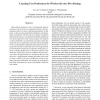212 search results - page 14 / 43 » Learning the task allocation game |
104
click to vote
GLOBECOM
2009
IEEE
15 years 4 months ago
2009
IEEE
—This paper considers a non-cooperative game in which competing users sharing a frequency-selective interference channel selfishly optimize their power allocation in order to imp...
113
click to vote
CCS
2005
ACM
15 years 6 months ago
2005
ACM
We present a game-theoretic model of the interactions between server and clients in a constrained family of commercial P2P computations (where clients are financially compensated...
115
click to vote
ACG
2009
Springer
15 years 7 months ago
2009
Springer
Abstract. Games are considered important benchmark tasks of artificial intelligence research. Modern strategic board games can typically be played by three or more people, which m...
128
Voted
ATAL
2004
Springer
15 years 6 months ago
2004
Springer
The problem of interest is how to dynamically allocate wireless access services in a competitive market which implements a take-it-or-leave-it allocation mechanism. In this paper ...
118
click to vote
GECCO
2009
Springer
15 years 5 months ago
2009
Springer
We apply CMA-ES, an evolution strategy with covariance matrix adaptation, and TDL (Temporal Difference Learning) to reinforcement learning tasks. In both cases these algorithms se...

